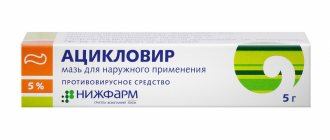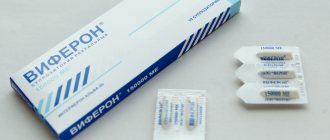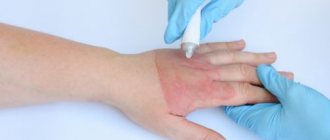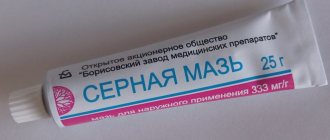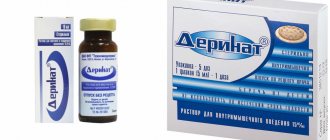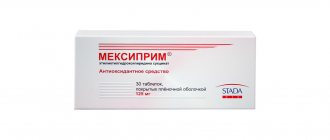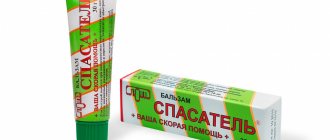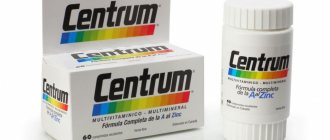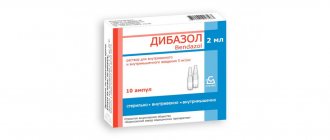Registration number:
LP-001277
Trade name:
Uroderm.
International nonproprietary or generic name:
Urea.
Dosage form:
ointment for external use
Composition:
- Active ingredient:
urea (carbamide) (calculated as 100%) - 0.300 g. - Excipients:
emulsion wax - 0.060 g, liquid paraffin (vaseline oil) - 0.060 g, glycerol (glycerin) (in terms of 100%) - 0.100 g, glycine (aminoacetic acid) - 0.002 g, ethanol (ethyl alcohol) 95% - 0.100 g, purified water to 1.0 g.
Description:
A homogeneous white ointment with a slight odor of ammonia.
Pharmacotherapeutic group:
keratolytic agent.
ATX Code:
D11AX
Pharmacological properties
It has a keratolytic effect, softens and moisturizes the skin, increases its elasticity.
Indications for use
In the complex therapy of skin diseases accompanied by excessive keratinization: ichthyosis and ichthyosiform dermatoses, keratoderma, psoriasis, chronic eczema, Devergie's disease, follicular keratosis, hyperkeratotic forms of fungal diseases; calluses, dry skin. Used to soften the skin and remove horny layers in case of warts (before removal) and to soften the nail plates in order to facilitate their cutting and treatment for ingrown nails, onychomycosis, onychogryphosis, onychodystrophy, hard nails.
Contraindications
Hypersensitivity to the components of the drug. Should not be applied to large surfaces in case of renal, hepatic or cardiovascular insufficiency.
Use during pregnancy and breastfeeding
The use of the drug is possible if the expected benefit to the mother outweighs the potential risk to the fetus and child. Caution must be exercised and used only on the advice of a physician. The drug should not be applied to large surfaces.
Directions for use and doses
Externally. For skin diseases accompanied by excessive keratinization (ichthyosis, ichthyosiform dermatoses, keratoderma, psoriasis, chronic eczema, Devergie's disease, follicular keratosis, calluses, dry skin), the ointment is applied to areas of accumulation of horny layers in a thin layer 2 times a day. For severe peeling, an occlusive dressing may be used. Before applying the ointment, superficial wounds, erosions, cracks, crusts, and abrasions are treated with antiseptics. Treatment is stopped after removal of the horny layers.
For hyperkeratotic forms of fungal diseases, the ointment is applied 20-30 minutes before external antifungal agents.
For warts, the ointment is applied for 2-8 hours under an adhesive plaster, then the softened part of the wart is cut off, after which it can be removed.
To facilitate trimming and treating nails with ingrown toenails, onychomycosis, onychogryphosis, onychodystrophy, and hard nails, the ointment is applied to the nails for 20-30 minutes, then they are trimmed. If the nails are significantly thickened, the ointment is applied 2 times a day, covered with an adhesive plaster, and treated after softening.
The duration of treatment for skin diseases depends on the location and severity of the process and can be several weeks. To facilitate trimming and treating nails, the ointment can be used 2-3 times a month; the duration of its use in such cases is not limited.
Side effects
When used in the acute period of a skin disease, in some cases there may be increased itching and redness of the skin at the sites of application of the drug, which requires its temporary withdrawal until the severity of the process decreases. Allergic reactions are possible.
Overdose
No cases of overdose have been reported to date.
Interaction with other drugs
The ability of urea to loosen the stratum corneum of the skin creates conditions for increased resorption of other external agents, which enhances their effect. The ointment can be alternated (morning and evening) with any other external agents, except keratolytic ones (salicylic ointment).
special instructions
Avoid contact of the drug with mucous membranes.
Impact on the ability to drive vehicles and machinery
The drug does not affect the ability to perform potentially hazardous activities that require increased concentration of attention and speed of psychomotor reactions (including driving vehicles, working with moving mechanisms).
Release form
Ointment for external use 30%. 10, 15, 20 and 35 g in an aluminum tube. Each tube, along with instructions for medical use, is placed in a cardboard pack.
Storage conditions
At temperatures from 2 to 8°C. Keep out of the reach of children. Do not allow freezing.
Best before date
3 years. Do not use after expiration date.
Conditions for dispensing from pharmacies
Over the counter.
Uroderm ointment external 30% 35 g x1
Trade name: Uroderm. International nonproprietary or generic name: Urea. Dosage form: ointment for external use Composition:
Active ingredient: urea (carbamide) (100% equivalent) - 0.300 g. Excipients: emulsion wax - 0.060 g, liquid paraffin (vaseline oil) - 0.060 g, glycerol (glycerin) (100% equivalent) - 0.100 g, glycine (aminoacetic acid) - 0.002 g, ethanol (ethyl alcohol) 95% - 0.100 g, purified water to 1.0 g.
Description: A homogeneous ointment of white color, a slight odor of ammonia is possible.
Pharmacotherapeutic group: keratolytic agent.
ATX code: D11AX
Pharmacological properties Has a keratolytic effect, softens and moisturizes the skin, increases its elasticity.
Indications for use In the complex treatment of skin diseases accompanied by excessive keratinization: ichthyosis and ichthyosiform dermatoses, keratoderma, psoriasis, chronic eczema, Devergie's disease, follicular keratosis, hyperkeratotic forms of fungal diseases, calluses, dry skin. Used to soften the skin and remove horny layers in case of warts (before removal) and to soften the nail plates in order to facilitate their cutting and treatment for ingrown nails, onychomycosis, onychogryphosis, onychodystrophy, hard nails.
Contraindications Hypersensitivity to the components of the drug. Should not be applied to large surfaces in case of renal, hepatic or cardiovascular insufficiency.
Use during pregnancy and breastfeeding The use of the drug is possible if the expected benefit to the mother outweighs the potential risk to the fetus and child. Caution must be exercised and used only on the advice of a physician. The drug should not be applied to large surfaces.
Directions for use and dosage: Externally. For skin diseases accompanied by excessive keratinization (ichthyosis, ichthyosiform dermatoses, keratoderma, psoriasis, chronic eczema, Devergie's disease, follicular keratosis, calluses, dry skin), the ointment is applied to areas of accumulation of horny layers in a thin layer 2 times a day. For severe peeling, an occlusive dressing may be used. Before applying the ointment, superficial wounds, erosions, cracks, crusts, and abrasions are treated with antiseptics. Treatment is stopped after removal of the horny layers.
For hyperkeratotic forms of fungal diseases, the ointment is applied 20-30 minutes before external antifungal agents.
For warts, the ointment is applied for 2-8 hours under an adhesive plaster, then the softened part of the wart is cut off, after which it can be removed.
To facilitate trimming and treating nails with ingrown toenails, onychomycosis, onychogryphosis, onychodystrophy, and hard nails, the ointment is applied to the nails for 20-30 minutes, then they are trimmed. If the nails are significantly thickened, the ointment is applied 2 times a day, covered with an adhesive plaster, and treated after softening.
The duration of treatment for skin diseases depends on the location and severity of the process and can be several weeks. To facilitate trimming and treating nails, the ointment can be used 2-3 times a month; the duration of its use in such cases is not limited.
Side effects When used in the acute period of a skin disease, in some cases there may be increased itching and redness of the skin at the sites of application of the drug, which requires its temporary discontinuation until the severity of the process decreases. Allergic reactions are possible.
Overdose No cases of overdose have been registered to date.
Interaction with other drugs The ability of urea to loosen the stratum corneum of the skin creates conditions for increased resorption of other external agents, which enhances their effect. The ointment can be alternated (morning and evening) with any other external agents, except keratolytic ones (salicylic ointment).
Special instructions Avoid contact of the drug with mucous membranes.
Effect on the ability to drive vehicles and machinery The drug does not affect the ability to perform potentially hazardous activities that require increased concentration of attention and speed of psychomotor reactions (including driving vehicles, working with moving mechanisms).
Release form Ointment for external use 30%. 10, 15, 20 and 35 g in an aluminum tube. Each tube, along with instructions for medical use, is placed in a cardboard pack.
Storage conditions At temperatures from 2 to 8°C. Keep out of the reach of children. Do not allow freezing.
Shelf life: 3 years. Do not use after expiration date.
Conditions for dispensing from pharmacies Without a prescription.
Indications for use
The product is used mainly to soften the skin and remove dense horny layers of dead cells. The composition is used on the eve of operations to remove warts, as well as to soften the trimming of excess formations with ingrown nails. The ointment is applied to treat hard nails, onychomycosis, onychodystrophy and onychogryphosis.
The product can also be used as part of complex therapy for the treatment of common skin pathologies:
- dermatoses of various nature;
- psoriasis;
- ichthyosis;
- Devergie pathology;
- eczema in chronic form;
- keratosis follicularis;
- fungal infections in hyperkeratotic forms;
- callus growths;
- dry skin.
Contraindications and side effects
The product should not be used in large quantities at once, applying to a large area of the skin. The main contraindications include:
- hypersensitivity to individual components;
- kidney and liver failure;
- heart failure.
During pregnancy and during lactation, taking the medicine is allowed, but only with caution. Preliminary consultation with a specialist is required. The use of ointment is possible only if the expected benefits clearly outweigh the potential risks.
If you use the ointment during an acute period of skin disease, itching and redness may occur in the area where the composition is applied. In these cases, temporary cessation of taking the drug is required. Allergic reactions are also possible. In such situations, you should stop taking it and consult your doctor. A change in therapy may be needed.
Ointment "Uroderm": description and pharmacology
The product is produced in the form of a white ointment, which contains urea. This is the only active ingredient, the amount of which reaches 0.3 g per 1 g of ointment. May give off a faint ammonia odor. The following auxiliary components are used: ethyl alcohol, glycerin, water, emulsion wax and others. The composition is packaged in aluminum tubes weighing from 10 to 35 g.
The ointment can only be stored in the refrigerator, the optimal temperature range is from 2 to 8 degrees Celsius. Avoid exposure to sunlight and keep away from children. The ointment should not be frozen. The shelf life, subject to the described conditions, is 3 years from the date of production.
The urea contained in the ointment gives a keratolytic effect. It softens skin tissue through abundant hydration. This increases elasticity and improves appearance.
Instructions for use "Uroderm"
The ointment is taken externally only. To eliminate keratinized formations, calluses, and dermatosis, the composition should be applied 2 times a day - in the morning and in the evening. If severe peeling is observed, the ointment is applied to the skin and covered with a bandage made of breathable fabric. If there are wounds, cracks or other damage to the cover, they are pre-treated using an antiseptic.
For fungal infections, surfaces are treated with ointment half an hour before applying the antifungal composition. To treat warts, leave the composition on the skin for 2 to 8 hours, placing an adhesive plaster on top. The wart then softens and is cut off.
In the case of thick, ingrown nails, the ointment is applied 2 times a day, an adhesive plaster is applied on top and treatments are carried out after each softening.
As a rule, the duration of the course of therapy is 2-3 weeks or more. To make nail trimming easier, the composition can be applied up to 3 times a day, also for several weeks or a longer period.
